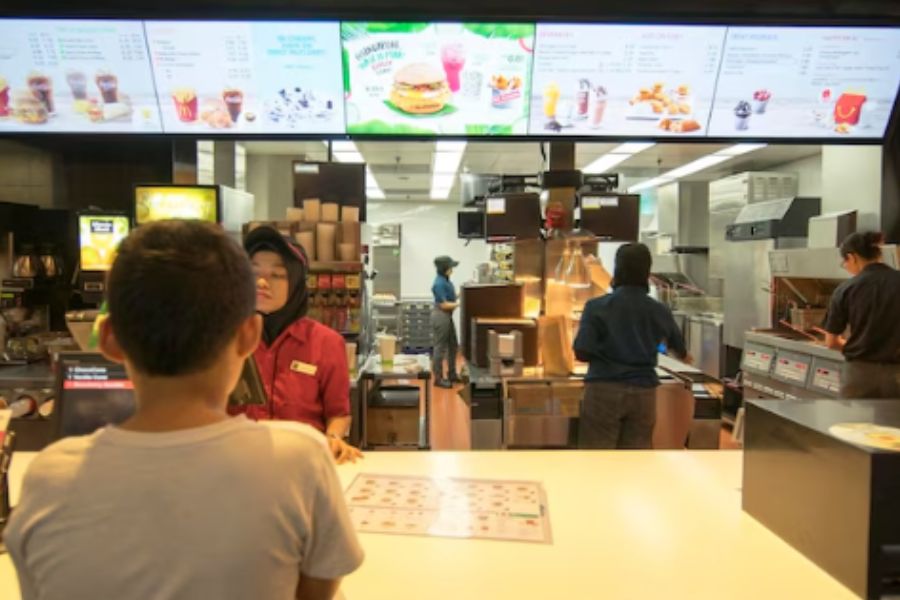Are you tired of juggling multiple systems to manage your retail store effectively? Have you ever wondered if there’s a simpler solution to streamline your operations and boost your sales? Well, look no further because the answer lies in the transformative technology of apparel cloud POS.
In this blog, let’s explore to power of apparel cloud POS, its features, advantages, and how it can propel your retail business to new heights. Now, let’s get started!
What is an Apparel Cloud POS System?
An apparel cloud POS system is a software solution tailored specifically for the retail apparel industry, designed to manage sales transactions, inventory, customer data, and more, all hosted on cloud servers. Unlike traditional POS systems that are installed locally on individual computers, cloud-based POS systems offer the advantage of accessibility from anywhere with an internet connection, providing real-time updates and data synchronization across multiple store locations.
The adoption of a POS system is crucial for retailers looking to stay competitive in today’s market. With features ranging from transaction processing to inventory management and sales analytics, a POS system significantly enhances operational efficiency.
It empowers retailers to make data-driven decisions, optimize inventory levels, and deliver exceptional customer service, ultimately driving profitability and growth.
Simplifying Retail Operations with Apparel Cloud POS
Apparel cloud POS systems offer a myriad of benefits, simplifying various aspects of retail operations:
Streamlining Inventory Management
One of the foremost challenges in apparel retail is managing inventory effectively to ensure optimal stock levels while minimizing the risk of overstock or stockouts. Apparel cloud POS systems revolutionize inventory management by providing real-time visibility into stock levels, product movement, and replenishment needs.
By automating tasks such as inventory tracking, stock transfers, and reordering processes, retailers can maintain a well-balanced inventory, reduce manual errors, and allocate resources more efficiently.
Enhancing Customer Experience
A seamless and personalized shopping experience is crucial for fostering customer loyalty and driving repeat business. These POS systems enable retailers to deliver exceptional customer service by accessing comprehensive customer profiles, purchase histories, and preferences at the point of sale.
With this wealth of information at their fingertips, sales associates can provide personalized recommendations, offer targeted promotions, and expedite checkout processes, ultimately enhancing customer satisfaction and loyalty.
Improving Sales Insights and Analytics
Data-driven decision-making is essential for staying competitive in the retail industry. Apparel cloud POS systems empower retailers with advanced sales insights and analytics capabilities, allowing them to gain deeper insights into sales performance, product trends, and customer behavior.
By analyzing key metrics such as sales by category, best-selling items, and customer demographics, retailers can identify growth opportunities, optimize pricing strategies, and tailor their merchandise assortment to meet evolving market demands.
In a nutshell, apparel cloud POS systems play a pivotal role in simplifying retail operations, from inventory management to customer engagement and sales analytics. By harnessing the power of cloud technology, clothing store owners can streamline processes, enhance customer experiences, and drive business success in today’s competitive retail landscape.
Key Features of Apparel Cloud POS
In the realm of apparel POS retail, leveraging an advanced cloud point-of-sale system offers a myriad of features, empowering businesses to thrive in today’s competitive market. Let’s explore some of the key features that make cloud POS systems indispensable:
Inventory Tracking and Management
Efficient inventory management lies at the heart of successful apparel retail operations. Apparel cloud POS systems provide robust inventory tracking and management capabilities, allowing retailers to monitor stock levels in real time, track product movement across multiple locations, and streamline replenishment processes.
With features such as barcode scanning, stock alerts, and automated inventory updates, retailers can optimize stock levels, minimize stockouts, and ensure a seamless shopping experience for customers.
For instance, consider a boutique specializing in designer clothing. With apparel cloud POS, the boutique can effortlessly track inventory levels in real time, ensuring optimal stock levels and preventing stockouts. This allows retailers to make data-driven decisions regarding purchasing, pricing, and promotions, ultimately maximizing profitability and customer satisfaction.
Omnichannel Integration
In an era where consumers expect seamless shopping experiences across various channels, omnichannel integration is essential for apparel retailers. Apparel cloud POS systems facilitate seamless integration between brick-and-mortar stores, e-commerce platforms, and mobile applications, enabling retailers to synchronize inventory, pricing, and customer data across all channels.
By offering a unified shopping experience, retailers can enhance customer engagement, drive sales, and build brand loyalty across multiple touchpoints.
For example, a fashion retailer can offer customers the option to purchase online and pick up in-store, providing a seamless shopping experience regardless of the channel they choose.
Flexibility
One of the standout features of apparel cloud POS is its flexibility. The system can adapt easily and quickly to market requirements and changes, enabling retailers to stay agile and responsive.
For instance, a fashion retailer launching a new product line can easily configure the POS system to accommodate the unique requirements of the collection, from pricing and discounts to product attributes and variants. This agility empowers retailers to capitalize on emerging trends and consumer preferences, driving sales and brand loyalty.
Data-driven POS System
Apparel cloud POS systems leverage advanced analytics to provide deep insights into customer behavior, preferences, and trends. For example, by analyzing customer shopping patterns, retailers can identify popular colors, styles, and sizes, enabling them to tailor their product offerings to meet demand effectively.
Moreover, by integrating customer relationship management (CRM) functionality, retailers can personalize interactions with customers based on their past purchase history, loyalty status, and preferences, fostering long-term relationships and repeat business.
Create Multiple Variants for the Products You Sell
Another key feature of apparel cloud POS is the ability to create multiple variants for the products you sell. This flexibility allows retailers to offer diverse options to customers, catering to their unique preferences and requirements.
For example, a clothing retailer can create variants for a single product, such as different sizes, colors, or styles, ensuring that customers can find the perfect fit for their needs.
Personalization
Personalization is a cornerstone of modern retail, and apparel cloud POS excels in this regard. By capturing and analyzing customer data, including client information, past purchase history, and loyalty status, retailers can create personalized one-on-one experiences with customers.
For instance, a luxury fashion retailer can use personalized recommendations based on a customer’s style preferences and purchase history to curate a bespoke shopping experience, fostering loyalty and increasing sales.
Multiple Payment Methods
Apparel cloud POS systems support a wide range of payment methods, offering convenience and flexibility to customers. Whether it’s credit/debit cards, mobile wallets, or alternative payment methods, retailers can accommodate diverse preferences and ensure a frictionless checkout experience.
For example, a fashion boutique can accept contactless payments via NFC-enabled devices, catering to the preferences of tech-savvy customers and enhancing the overall shopping experience.
Customer Relationship Management (CRM)
Building and nurturing customer relationships is paramount in the competitive apparel industry. Apparel cloud POS systems come equipped with robust customer relationship management (CRM POS) features, allowing retailers to capture and centralize customer data, including purchase history, preferences, and contact information.
By leveraging CRM functionalities such as customer segmentation, loyalty programs, and personalized marketing campaigns, retailers can foster deeper connections with customers, drive repeat purchases, and increase customer lifetime value.
For instance, retailers can segment customers based on their buying behavior and send targeted promotions or personalized offers, fostering engagement and loyalty.
Self-checkout
Self-checkout functionality is becoming increasingly popular in retail environments, offering convenience and efficiency to both customers and retailers. Apparel cloud POS systems support self-checkout options, allowing customers to scan and pay for their purchases independently.
For example, a department store can deploy self-checkout kiosks equipped with POS software, reducing wait times during peak hours and enhancing the overall shopping experience.
AI Facial recognition
Innovative technologies such as AI facial recognition are reshaping the retail landscape, offering new opportunities for customer engagement and security. Apparel cloud POS systems can leverage AI facial recognition to enhance security measures and personalize customer experiences.
For example, a high-end boutique can use facial recognition technology to identify VIP customers as they enter the store, enabling staff to provide personalized assistance and recommendations tailored to their preferences.
Reporting and Analytics
Data-driven decision-making is essential for driving business growth and profitability. Apparel cloud POS systems offer comprehensive reporting and analytics tools, enabling retailers to gain valuable insights into sales performance, inventory turnover, and customer behavior.
With detailed reports and visual dashboards, retailers can identify trends, pinpoint areas for improvement, and make informed business decisions. Whether it’s analyzing sales by product category, tracking marketing campaign effectiveness, or forecasting demand, robust reporting and analytics capabilities empower retailers to optimize their operations and stay ahead of the competition.
For example, retailers can generate detailed reports on product sales by category, analyze trends over time, and identify opportunities for optimization and improvement.
Benefits of Cloud POS for Apparel Retailers
Apparel cloud POS systems have emerged as a cornerstone of modern retail operations, offering a wide array of benefits to retailers seeking to optimize their operations and drive business growth.
Let’s explore some of the key benefits of cloud POS and their significance for retailers.
Remote Access Capability
One of the standout features of apparel cloud POS is its remote access capability, which allows retailers to manage their operations from anywhere with an internet connection.
For example, a boutique owner can monitor sales performance, track inventory levels, and generate reports from the comfort of their home or while traveling. This flexibility empowers retailers to stay connected and make informed decisions on the go, without being tied to a physical location.
Reduced Initial Investment and Cost-effectiveness
Apparel cloud POS systems offer a cost-effective alternative to traditional POS solutions, reducing the initial investment required to set up and maintain a POS system. Unlike traditional hardware-dependent systems that require costly infrastructure and ongoing maintenance, this POS operates on subscription-based models, eliminating the need for expensive hardware upgrades and maintenance contracts.
For instance, a startup clothing brand can launch its retail operations with minimal upfront costs by leveraging a cloud-based POS system and reallocating resources to other areas of the business such as marketing and inventory management.
Ability to Scale
Scalability is essential for retailers seeking to expand their operations and accommodate growing business needs. These POS systems offer scalability, allowing retailers to scale their operations seamlessly as their business grows.
Whether opening new stores, expanding into new markets, or launching e-commerce platforms, retailers can rely on the POS to support their growth initiatives without the need for extensive reconfiguration or investment in additional infrastructure.
For example, a fashion retailer experiencing rapid growth can easily add new POS terminals and integrate them into their existing system, ensuring continuity and efficiency across all locations.
Streamlined Workspace
The POS systems streamline the in-store workspace, reducing clutter and enhancing efficiency. With cloud-based POS solutions, retailers can replace bulky hardware and manual processes with sleek, intuitive interfaces that require minimal space.
For instance, a boutique can replace traditional cash registers with tablets or mobile devices running Apparel cloud POS software, freeing up valuable counter space and creating a more inviting shopping environment for customers.
Ensured Consistency
Consistency is key to building a strong brand identity and fostering customer loyalty. Cloud POS systems ensure consistency across all aspects of retail operations, from pricing and promotions to inventory management and customer service.
For example, a chain of clothing stores can maintain consistent pricing and promotional strategies across all locations using centralized apparel cloud POS software, ensuring a cohesive brand experience for customers regardless of where they shop. This consistency builds trust and confidence among customers, encouraging repeat business and long-term loyalty.
FAQs: Apparel Cloud POS
What is POS in the Fashion Industry?
A POS system in the fashion industry is a software solution that facilitates transaction processing, inventory management, and sales analytics tailored to the unique needs of clothing retailers.
How Much Does a Cloud-based POS System Cost?
The cost of a cloud-based POS system varies depending on factors such as the vendor, the number of features included, and the scale of the business. Generally, pricing is based on a subscription model, with monthly or annual fees ranging from a few hundred to several thousand dollars.
What is the Difference Between Cloud POS and Modern POS?
While both cloud POS and modern POS systems offer advanced features and capabilities, the key difference lies in their infrastructure. Cloud POS systems leverage cloud technology to store data and operate over the internet, offering greater flexibility, scalability, and accessibility compared to traditional on-premises POS systems.
Conclusion
In conclusion, apparel cloud POS systems have emerged as indispensable tools for retailers looking to uncomplicate operations, enhance customer experiences, and drive business growth. By leveraging advanced features such as real-time inventory tracking, omnichannel integration, and robust analytics, retailers can gain a competitive edge in today’s dynamic retail landscape.
If you seek additional information on this topic, we invite you to reach out to us directly.



